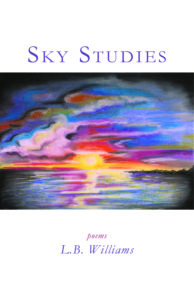 Review by Carole Mertz
Review by Carole Mertz
– Williams’ poems move from death to life and from life to death as she traverses themes of miscarriage, fertility in woman and in earth, scenes of grief, but scant joy. A tone of quiet regret underlies many of the verses. Any mother who has lost a child will appreciate the stark images of emptiness and sorrow conveyed in “Song” and “Eight Weeks.”
There are no specific divisions in this short collection. We experience free verse poems about a woman’s desire to conceive, birth, loss of a child, loss of a parent, the caring of a young child, the revisiting of former addresses, separated parents, and graves.
In “One Should Know Winter,” the author makes us lament the dying, even as in her final line of stanza four, she calls for sleep. I like these passages for the way the repeated element of “forming” balances so perfectly the element of “dying.” In fact, these lines are among the best in the collection. In the fifth stanza we read:
Behind the house, in the light, the ants like to sleep.
All night they work so hills of soil are formed.
They are busy and do not think of dying,
The ground is dry, leaves have disappeared.
At least it will not always be winter.
In April I will hope once more for a child.
Coming upon the poem “Grace,” we feel a kind of blessing and relief from the themes of pain and loss of the previous pages. (A boy and his mother enjoy a simple game of Frisbee while “Low gray clouds move quickly by/ this solemn sky.”) But even here, the horizon is darkened.
Though “Interior Landscapes” gives us specific places in New York’s Borough of Queens, (I enjoyed travelling through the poem from Northern Boulevard, to 53rd Street, and on to the Waldorf Astoria, all places I know well) some of the poems are written in fragmented phrases that merely suggest ideas or scenes. For example, in “Poem” we read:
The avocados on the table
this morning marred by light
from the moon’s sneeze so subtle
I couldn’t hear
it slice the motorcycles
in my dreams…
Reflecting on this poem’s final line, we wonder why the white tulips are a reproach to the persona within the poem.
Williams tells us she is influenced by Daisaku Ikeda, and we can discern the Buddhist element in her work. Though I appreciate the cloudy aspects of a dream poem, hazy qualities pervade many of these poems, sometimes to good effect, and sometimes begging more precision. See for example, “…in red and orange boats near the edge of the water where waiting is another pond another possibility.” from “Gull Pond.”
I found “For Sam” the most endearing of the twenty-one poems. (In this verse, Williams gives a nod to poet, Cynthia Zarin.) Through simple child-like rhyming we can envision the child at play, perhaps babbling while he plays: “My whale, my sail, my little pale…“
For her lyrical style, we can look forward to Williams’ next collection.
Sky Studies
By L.B.Williams
Finishing Line Press
Georgetown, KY (2014)
ISBN 9781622297467
Carole Mertz has reviewed for World Literature Today, Arc Poetry Magazine, Copperfield Review, The Conium Review, and Christian Communicator. Her essay on Time Management is in Writing after Retirement, Smallwood & Redman-Waldeyer, Eds. She writes in Parma, Ohio.
